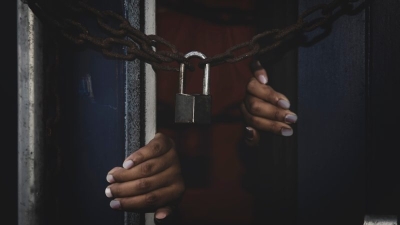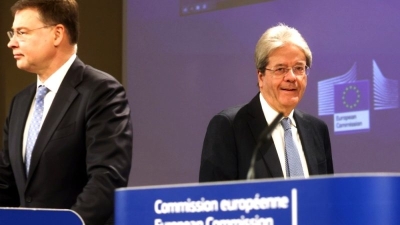Plans to ban fossil fuel heaters spark outrage in Germany

A draft law to ban the installation of new oil and gas heaters from next year has sparked outrage in Germany, adding fuel to continued government infighting in Berlin between the Greens and the Liberals.
About 20 million homes in Germany are heated with gas, most of which used to be imported cheaply from Russia.
So when supplies started drying out last year after the Kremlin ordered the invasion of Ukraine, German households were caught in a bind – heating was getting more costly and uncertain.
In March 2022, the heads of the German government gathered for late-night talks on how to tackle the energy crisis and the country’s dependence on Russian gas.
The talks resulted in more government support for households and businesses. But it also had one additional result – a 2025 ban on new fossil fuel boilers enshrined in the coalition treaty was to be pulled forward by a year.
“We will now stipulate in law that from 1 January 2024, as far as possible, every newly installed heating system should be 65% powered by renewable energies,” reads the agreement dated 23 March.
This amounts to a de facto ban on traditional heating systems, leaving just heat pumps, district heating and biomass as a fallback solution.
The challenge is massive: despite anxiety over gas supply, Germans still installed 600,000 new gas boilers in 2022, according to government statistics. Heat pump sales, the future workhorse of the heating transition, amounted to just 236,000 while some 70,000 additional households were connected to heating grids.
Gas boilers have an average life expectancy of up to 30 years. Given that Germany wants to be climate neutral by 2045, this means there is a clear mismatch between the country’s climate targets and its heating systems.
Yet, when the economy and climate ministry headed by Robert Habeck circulated a draft law to put the fossil heating ban into motion, the liberal FDP party and leading newspapers sprang into action.
“This is how the heating hammer hits YOU,” titled the best-selling tabloid Bild. Finance Minister and FDP leader Christian Lindner told the tabloid, that, “the draft was well-intentioned in terms of climate policy, but economically and socially the echo is devastating.”
The plans would have to be “fundamentally revised” for his party to assent, Lindner added. A similar sentiment reportedly came from the construction ministry, which is in the hands of the social democrat SPD party.
In theory, the draft law was coordinated with the construction ministry, and includes several social exceptions. For instance, heaters that aren’t wholly defunct may simply be repaired. The draft law comes equipped with derogations if houseowners intend to connect to the district heating grid, as well as for multifamily homes who received extra time to decide on their heating.
Those who can’t afford to implement the new rule are exempted entirely. Partial solutions envisaged for existing houses include gas boilers running on biomethane or hydrogen, as well as hybrid heat pumps, with backup gas capacity for especially cold days.

Three countries became heat pump forerunners in 2022, Germany did not
Heat pump sales, an integral part of the EU’s plan to kick Russian gas to the curb, saw record growth in 2022, with France, Poland and Finland standing out most, however, Germany is not among them.
Lessons for Europe
While Germany has the largest gas boiler problem in the EU, other countries have devised similar schemes in order to reduce the climate and energy footprint of their building sectors.
According to the European Heat Pump Association, a lobby group, nine European countries have plans to clamp down on new fossil heating systems in the coming years.
In Austria, adding fossil heaters to new buildings was banned from 2023, with generous exceptions for buildings under construction, followed by a stepwise mandatory replacement of antiquated oil and coal heating systems. Here, opposition to the scheme was limited and came largely from gas companies.
In the Netherlands, new fossil heating systems will be banned from 2026, although power grid capacity issues that emerged last year in the country’s south may see these plans partially delayed.
Flanders, the Northernmost and richest region of Belgium, has restricted oil boilers from 2022 and new gas connections will be banned from 2025. In Denmark, renewable heating in newly constructed buildings is largely mandatory already.
Adding oil and gas boilers to new houses will be banned in Ireland from 2023, and installing them in existing buildings will be banned from 2025. Similar plans exist for Slovakia. In Italy, a 60% share of renewable energy in new buildings has been mandatory since mid-2022.
But in Germany, despite ample social provisions and plans to shift state support almost entirely towards heat pumps, significant opposition to the law could not be avoided.
While this may be in part due to constant government infighting between the Greens and the liberals, who appeared all too eager to make an issue of the fossil boiler ban, similar levels of opposition in other EU countries cannot be ruled out.

Growing demand puts EU electricity grid under pressure
Europe’s power grid is under pressure, faced with growing demand from electric vehicles and heat pumps as well as lagging investments in new infrastructure. Is a blackout imminent?



